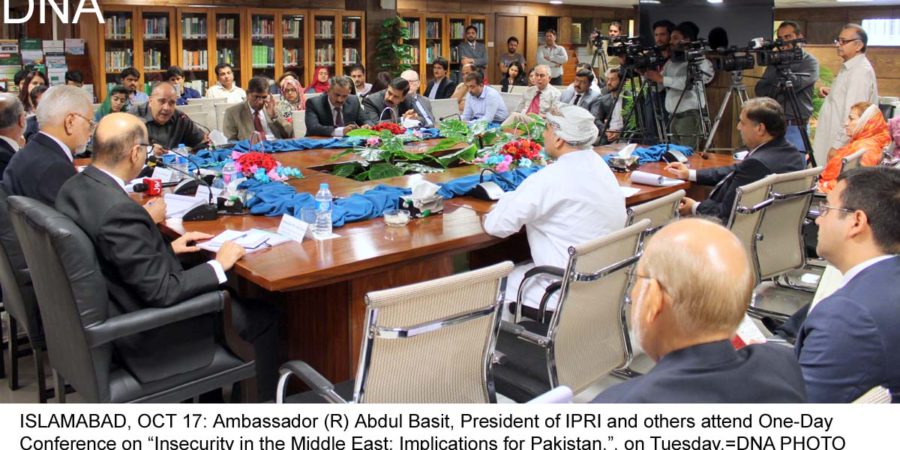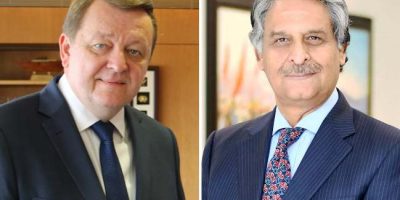One-Day Conference on “Insecurity in the Middle East: Implications for Pakistan held in Islamabad

ISLAMABAD, OCT 17 (DNA) – Pakistan’s decade-old approach to the Middle East shaped by competing religious and post-colonial heritages needs re-imagining given the rise of new power poles in the Middle East, and focus on a more structured, firmer policy. The country needs to redefine its security interests and cultivate partners in the Middle East beyond the Saudi Arabia-Iran binary. Given Russian support for the Assad regime in Syria driving up the international community’s stakes in the region, Pakistan must tread cautiously and not take sides. This was the consensus of the speakers at the One-Day Conference ‘Insecurity in the Middle East: Implications for Pakistan’ organised by the Islamabad Policy Research Institute, here in the capital today.
Ambassador (R) Abdul Basit, President IPRI, in his welcome address said that instability in the Middle East directly affects Pakistan. He highlighted that it is important to analyse the geostrategic and geoeconomic drivers of the crisis and review the policy measures that can be taken by Pakistan to identify issues arising out of the crisis and to guard the country’s interests there. He hoped that the Conference would come up with useful recommendations on the subject for the decision-makers to plug loopholes in the Government’s Middle East policy.
In his keynote address, Ambassador Inamul Haque, Former Minister and Secretary of Foreign Affairs, and Chairman, Board of Governors, IPRI said that the turmoil in the Middle East is neither spontaneous nor random. It has been a deliberate long-term policy of the United States to create chaos in the region, particularly since 9/11. ‘US policies are designed to promote civil conflict to give it the excuse to physically intervene to force regime change, create new borders and countries and ensure permanent Israeli hegemony in the region. Other strategic objectives include control over Middle Eastern oil and redrawing the map of the region’, he stressed. Ambassador Inam was of the view that US has committed aggression against Iraq, Libya and Syria – all secular authoritarian states and the world watches silently as Yemen is being destroyed its population decimated through famine and cholera. According to Ambassador Inamul Haq, ‘While the US and West use noble sounding slogans of Right to Protect or Humanitarian Intervention and introducing democracy and human rights to the benighted people of the region, the fact is that this so-called nation-building is sought to be achieved through brutal use of force.’
The massive loss of life and the displacement of millions of local people in these ignoble and barbaric ventures are of no concern to the US, he reiterated. Discussing the situation in Syria, he said preparations for the conflict must have included the staging of the uprising in 2011 against Bashaar Assad, as the precursor to and the reason for his regime’s removal. ‘The US and Western countries have provided weapons, training, money and safe havens to the Syrian rebels, including the Syrian National Council, the Syrian National Coalition. ‘For quite some time they also turned a blind eye to the presence of AI-Nusra, a branch of AI-Qaeda and the Islamic State. ‘It is interesting that when the United States and its allies are acting to effect regime changes in different countries they are above criticism, but if some other country steps in to help the regime survive, they are accused of blatant interference in the internal affairs of that country’, he remarked. The US intention has never been to promote democracy and tolerance, but extremist religious narratives and regimes. The so-called Arab Spring was a flash in the pan, perhaps encouraged and certainly exploited by the US and the West. He concluded that it is imperative for Pakistan not to take sides in any intra-Islamic dispute and especially not in intra-Arab disputes and wars.
Speaking on the topic ‘Middle East Crisis and Pakistan’s Foreign Policy Challenges’, Dr Nazir Hussain, Director, School of Politics and International Relations, Quaid-i-Azam University, said that despite the lack of ideological confluence, there are more reasons and opportunities in the Middle East for convergence than divergence which need to be identified. He said that with the growing political security complexities in the Arab world, it is Palestine and its people which lose. ‘Unfortunately, the Middle East has never been at peace since 1920, and this needs to be seen in the context of intra-Arab rivalries. Seeds of discord and discontent already present in the Arab world have been exploited by extra regional players,’ he remarked. Dr Hussain went on to say that the Arab Spring has turned into Arab Winter.
Hepointed out that current geopolitical dynamics are challenging for Pakistan which needs to maintain a balance in its relations with Riyadh and Tehran. ‘As our economy benefits from the remittances sent by Pakistani diaspora in the Gulf, Pakistan cannot ignore its Muslim neighbours.’ Responding to a question, he said that Pakistan needs to warm up its cold ties with its immediate neighbour besides maintaining its amiable relations with Saudi Arabia.
Dr Ejaz Shafi Gilani, Chairman of Gallup-Pakistan, provided up to date population, trade, GDP, military expenditure of the 22 economies of the Middle East and North Africa (MENA). He was of the view that any research first needs to define which countries specifically fall in this region. He shared that with its 400 million population and high per capita income, MENA’s 4 trillion dollar economy has been spending USD 118 million on military expenditures, and receiving USD 136 billion in foreign direct investment (FDI).
He informed that Pakistan has 1.9 million workers in Saudi Arabia, while the UAE is home to 1.2 million, and Oman, Kuwait, Qatar and Bahrain nearly .7 million Pakistani workers which is nearly 50 per cent of the total workers abroad. 63 per cent of remittances to Pakistan’s national exchequer come from Saudi Arabia (29 per cent), UAE (22 per cent) and other Gulf Cooperation Countries (12 per cent). He pointed out that contrary to popular perception, Saudi Arabia and UAE FDI to Pakistan has reduced dramatically over the years and has now been overtaken by China. He was optimistic that the United States repeated military and strategic failures in the region and Pakistan with its second largest Muslim population, by far the largest Army, economy and history of legitimacy in the region can be used to bridge the trust deficit in the Muslim world, especially in the Middle East to remove the barriers that have impeded politico-economic development in the region. The Conference was attended by a large number of participants, including members of diplomatic missions in Islamabad, former diplomats, academics, students and journalists.
Related News

Pakistan, Belarus mark 30 years of the establishment of diplomatic relations
ISLAMABAD, FEB 3 /DNA/ – Foreign Minister Jalil Abbas Jilani has exchanged messages of heartfeltRead More
ANF seizes over 74 kg drugs, 1830 intoxicated tablets
ANF seizes over 74 kg drugs, 1830 intoxicated tablets RAWALPINDI, Dec 14 (APP):Anti-Narcotics ForceRead More


Comments are Closed